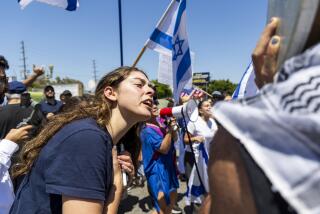Marches and vigils are held across California to protest Russian invasion of Ukraine
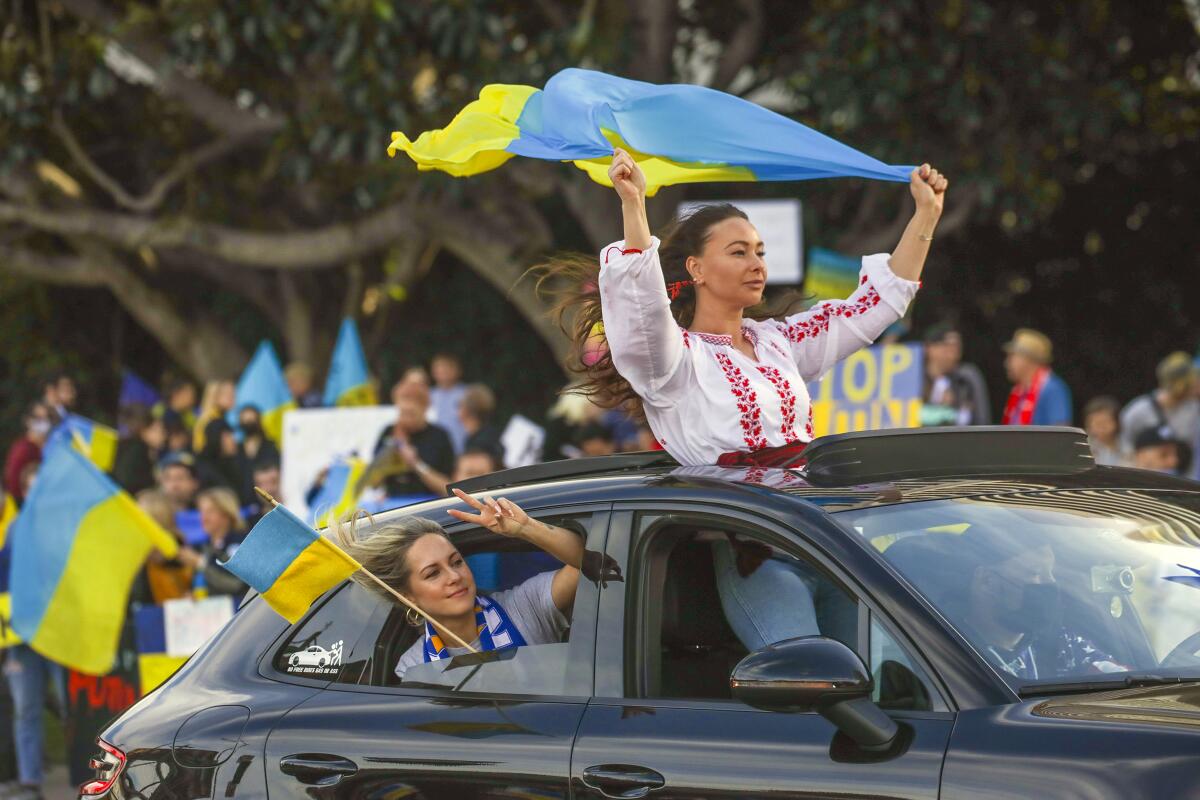
- Share via
Demonstrators marched and staged vigils across California on Saturday to protest the Russian invasion of Ukraine, many expressing fear for friends and family in the war-torn country 6,000 miles away.
Waving signs that said “Stop Putin,” about 100 Ukrainian Americans and Russian Americans opposed to the invasion kicked things off about 10 a.m. with a march through Hollywood. Residents of apartment buildings along Hollywood Boulevard waved and shouted messages of support from their balconies to the group, which included several families with young children.
“Putin doesn’t speak for us,” said Erina Volodartseva, 32, who is Russian and brought along her children, ages 6 and 4. “We are against the war. Ukraine is our brother.”
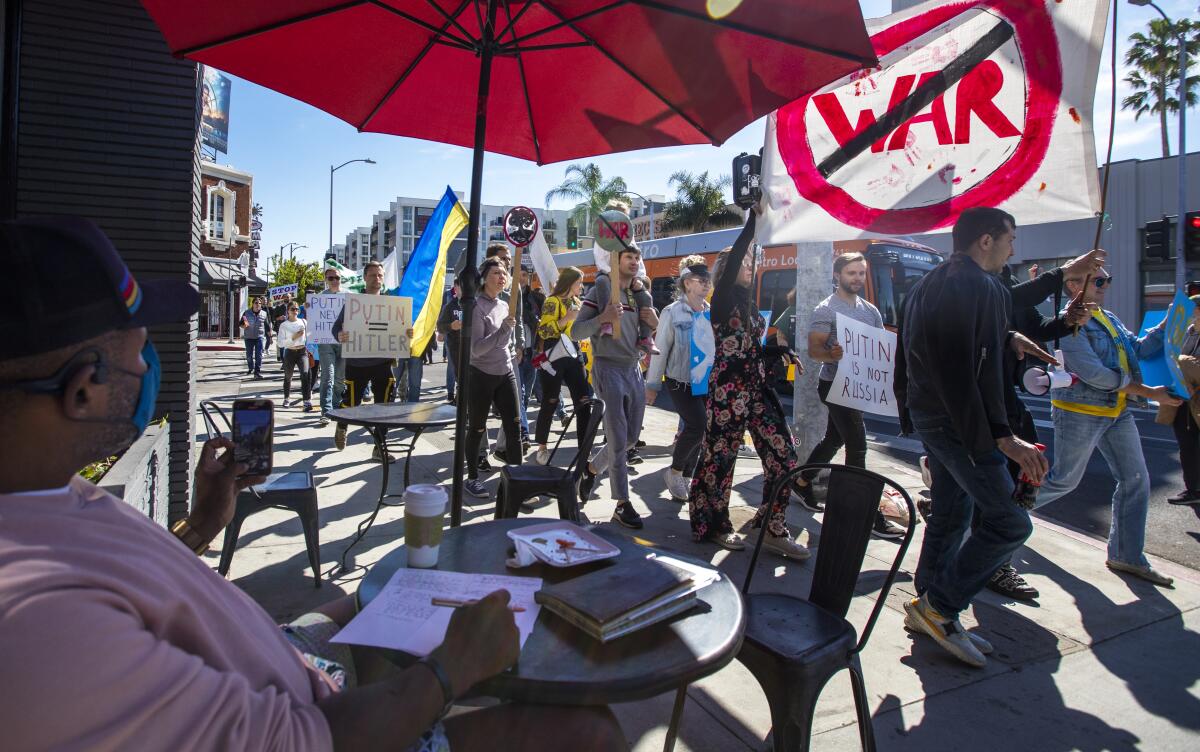
Samvel Torosyan, 25, said that he texts regularly with his friends in the Russian military, including one who is a fighter pilot. “They are afraid,” said Torosyan, who is also Russian, as he passed shops and restaurants on the boulevard.
Like some others at Saturday’s march, Torosyan said he doesn’t want to see the U.S. send its own military to Ukraine because he fears that could lead to a nuclear war.
“I just want it to stop,” Torosyan said of the Russian aggression.
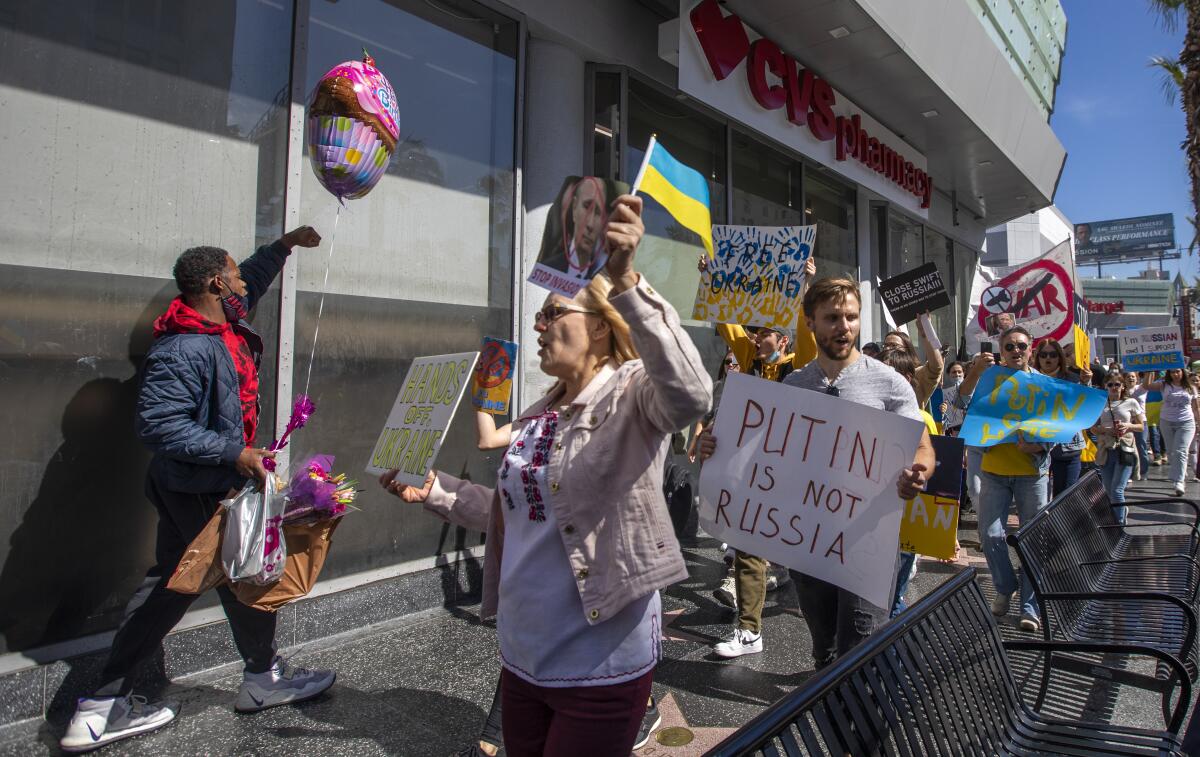
“It’s a crazy situation,” said Diana Leli, 45, a blue-and-yellow Ukrainian flag draped around her shoulders.
Leli, who lives in Valley Village, said she moved to the U.S. from Ukraine two years ago. She showed a Times reporter messages from the group texting app that she uses to talk to her mother and other relatives in that country. Her mother is 78 and lives in Zaporizhia, a city in southeastern Ukraine, Leli said. Three border guards were recently killed in the area, according to news reports.
“We hope Putin will stop,” Leli said, adding that she doesn’t trust the news coming out of Russia. “We’re scared.”
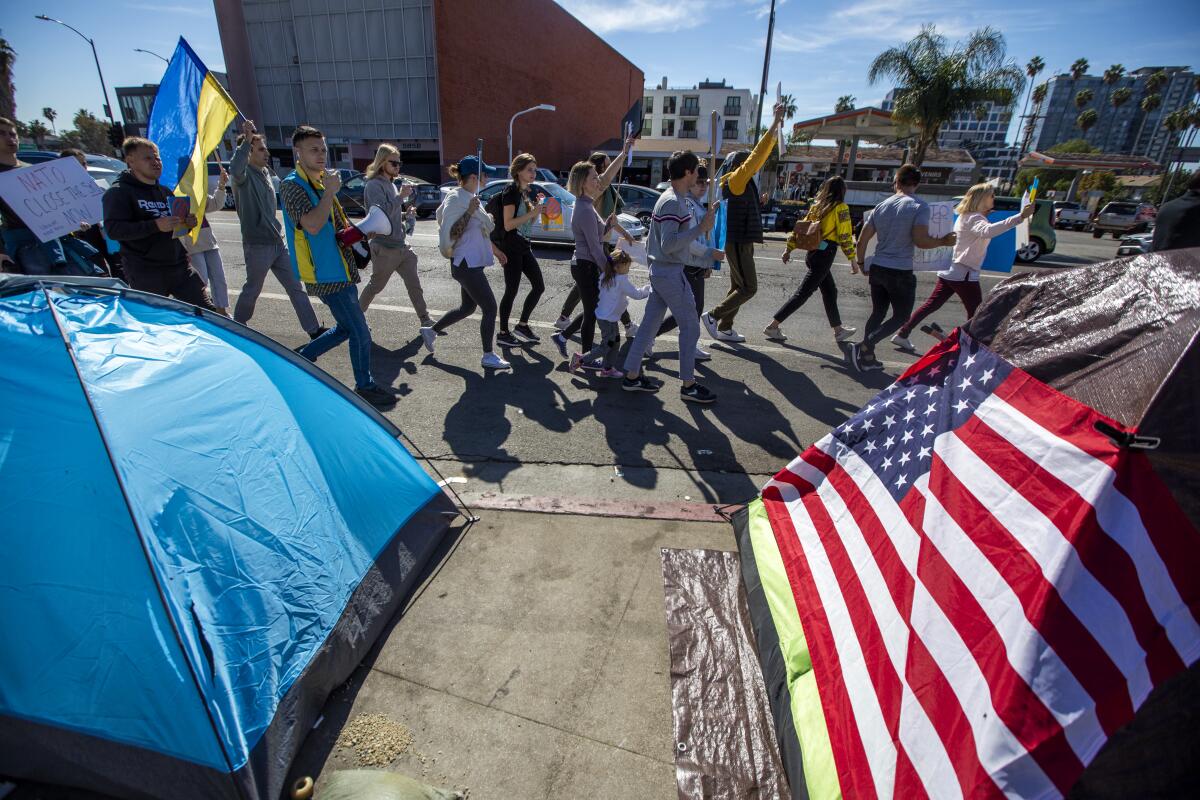
In Westwood, Ukrainian flags flapped in the breeze as drivers along Santa Monica and Sepulveda boulevards honked in support of dozens of demonstrators who had gathered there, waving signs and chanting “Save Ukraine” and “Glory to Ukraine.”
Most of the demonstrators were Ukrainian Americans, but there were also people from Latvia, Lithuania, Taiwan, Iran, Greece and Bosnia. Chuck Olynyk, 65, a Ukrainian American and retired history teacher, said all week he’s been following the news about the Russian invasion.
“I’m heartbroken,” Olynyk said. “I’ve had to step away from the TV and work in the garage.”
Olynyk said he still has family in Ukraine but lost touch with them years ago. He hopes they’re safe. He said his parents and sister were born there but have since died.
“They would have been devastated to see this,” he said.
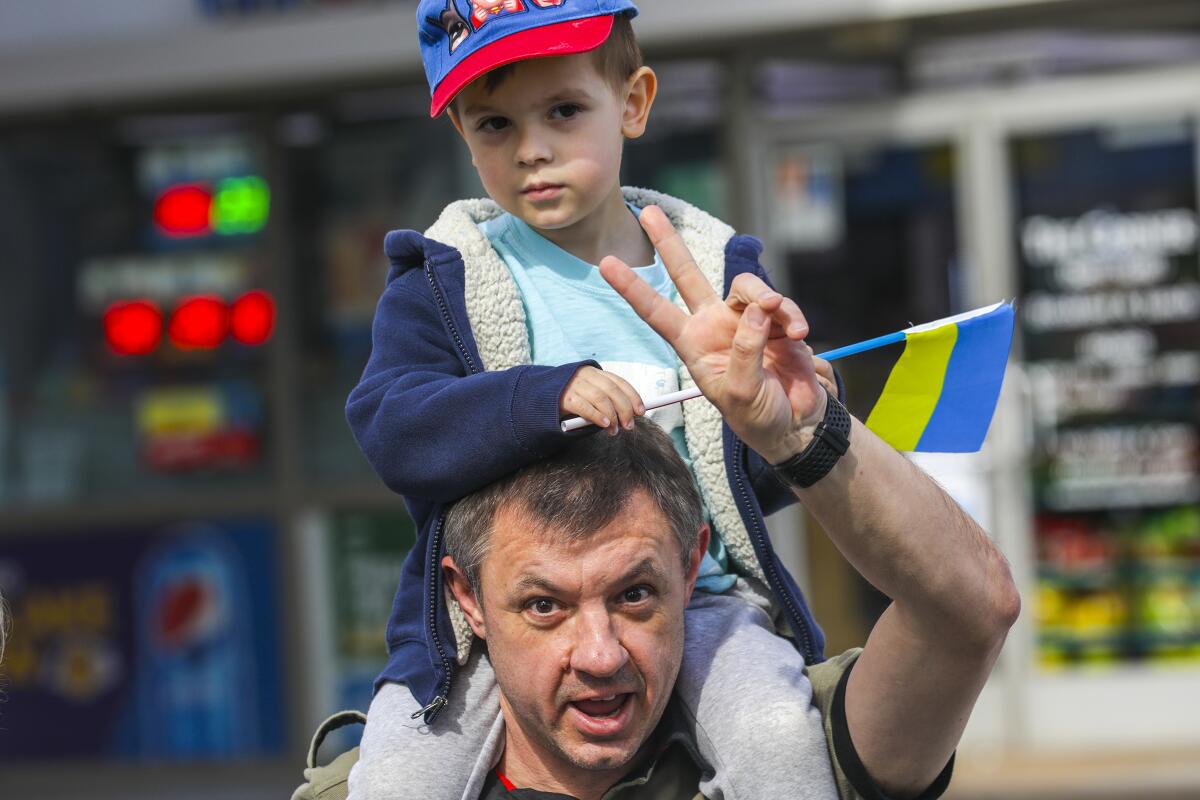
Olynyk said he felt proud seeing Ukrainian citizens take up arms. He was especially touched by a video he saw of an elderly Ukrainian woman who was handing out sunflower seeds to Russian soldiers.
“She told them to put them in their pockets so that at least sunflowers will grow when they die,” Olynyk said, nearly in tears. “The sunflower is Ukraine’s national flower.”
Igor Alksnin, of Tarzana, stood alongside a friend holding a Ukrainian flag. Alksnin, who was born in Ukraine and later became a U.S. citizen, said he needed to come out to support his homeland.
“I’m here to cry out for help on their behalf, it’s the least I can do,” he said.
He said he’s worried about his stepfather, who is still living in Kyiv, Ukraine’s capital. He said he had spoken on the phone with him earlier and that he was doing OK and staying in his apartment. Alksnin said he’s also worried for his grandson, who is in the military.
“I’m going to pray for him like crazy,” he said.
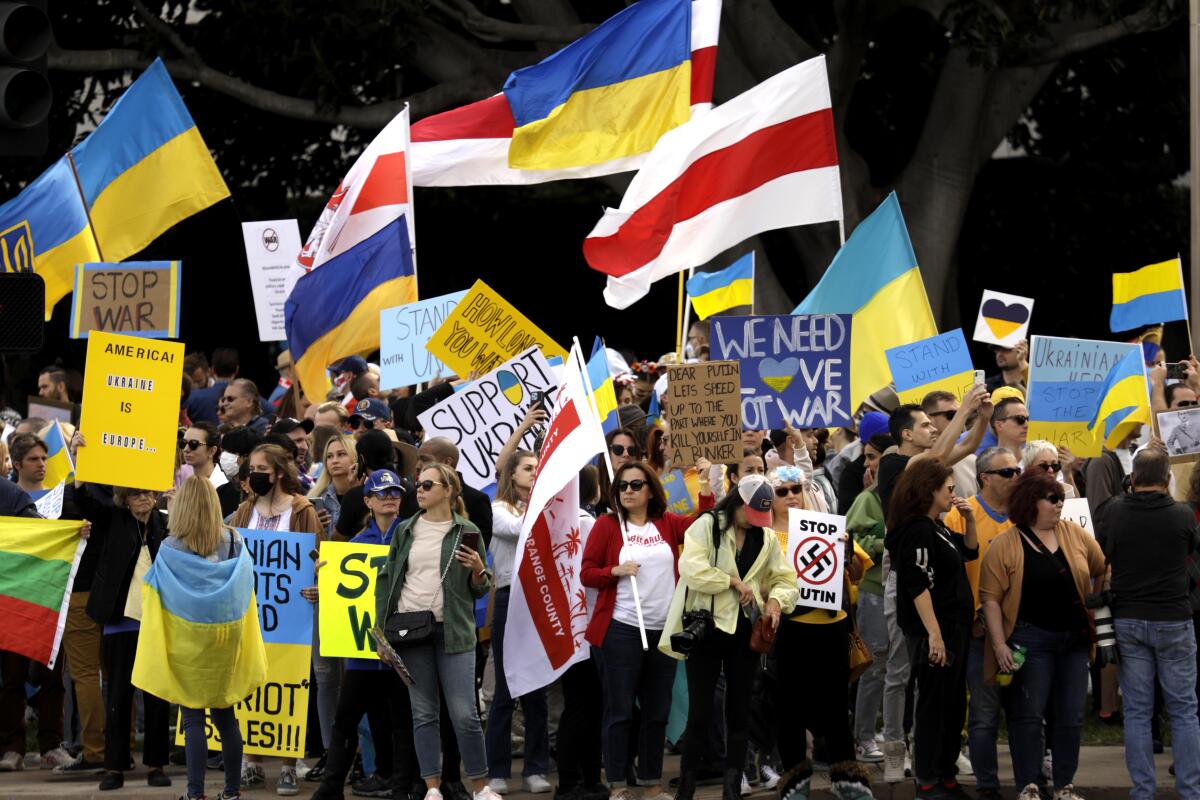
Along Sepulveda Boulevard, Gana Hovey, 37, held a small sign that read “Putin must Stop.” Hovey, a U.S. citizen, said her parents live in Kharkiv, the second-largest city in Ukraine and one of several cities that were bombed.
“My parents have been staying in a bomb shelter for the past three days,” she said. “When they tell me things are quiet, I feel so relieved. All I want to hear is that things are quiet.”
Sitting on a bus bench nearby, Hovey’s son, 7-year-old Leonardo, waved a small American flag.
“He wants to see his grandmother again,” she said. “She comes to the U.S. every summer, and now I don’t know.”
Hovey said she hasn’t slept for the last three days. She said she’s grateful she can still communicate with her parents. When they hang up, she said, “I just hope it’s not the last time.”
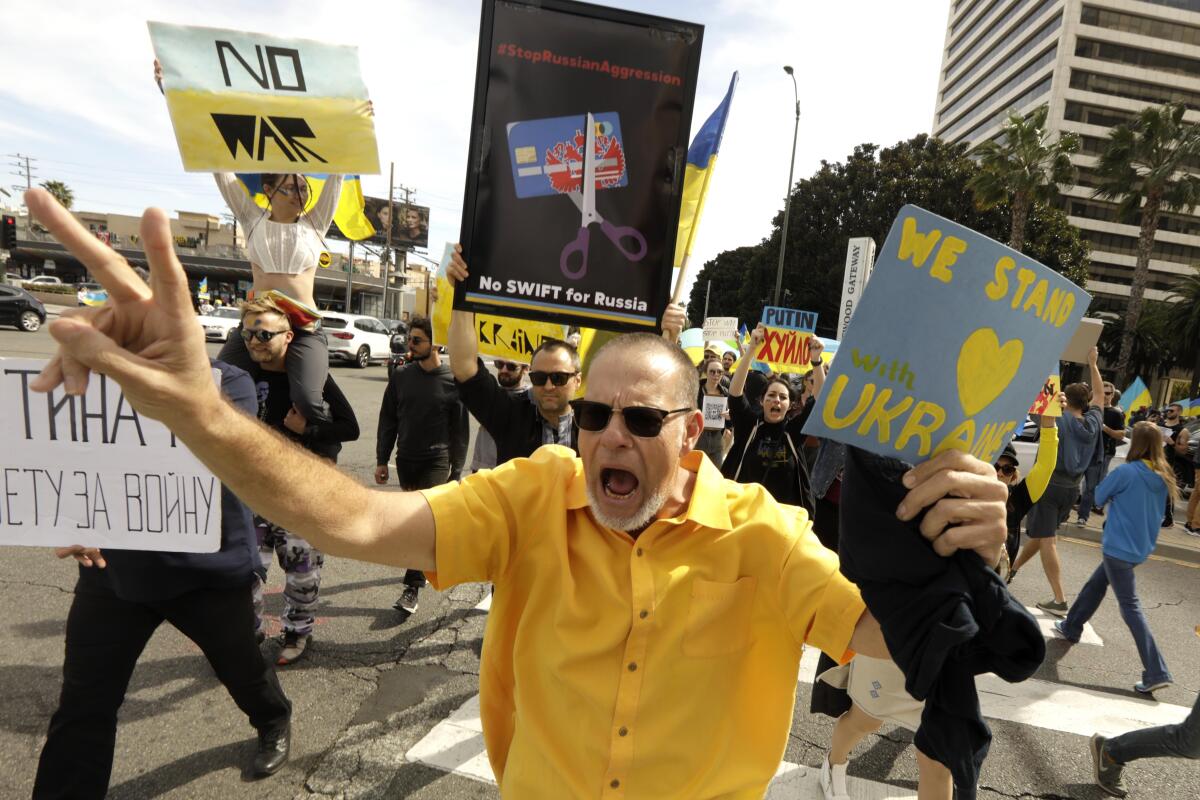
In Sacramento, home to one of the largest Ukrainian populations in the country, hundreds gathered Saturday morning for a vigil outside a Ukrainian church in the suburb of Orangevale.
Valentyna Halazetdinova, 69, stood clutching her phone and periodically glancing at it with frightened eyes.
On the phone were texted photos from her children in the Ukrainian town of Vinnytsya, near Kyiv, showing her grandchildren, Yanna, 5, and Zlata, 4, dressed in brightly colored outfits and playing in a bomb shelter.
“It is so hard to see,” said Halazetdinova’s daughter, Svetlana Ivantsov, 36, who moved to the U.S. from Ukraine a year ago and described, in a torrent of words, how images of her siblings hunkered in bomb shelters poured into her phone night after night.
From Sacramento, mother and daughter sent texts back, expressing love and prayers. But they felt so helpless. So they had come here, to the Spring of Life, a Ukrainian Baptist Church, to be with hundreds of other Ukrainian immigrants who gathered to sing and pray and comfort one another as their country is consumed by war.
Greater Sacramento has about 100,000 Ukrainian residents, according to Vlad Skots, head of Ukrainian American House, a nonprofit that supports cultural and economic relations between the two countries.
Saturday’s event drew Sacramento Mayor Darrell Steinberg, U.S. Sen. Alex Padilla and several members of the state Assembly and Senate.
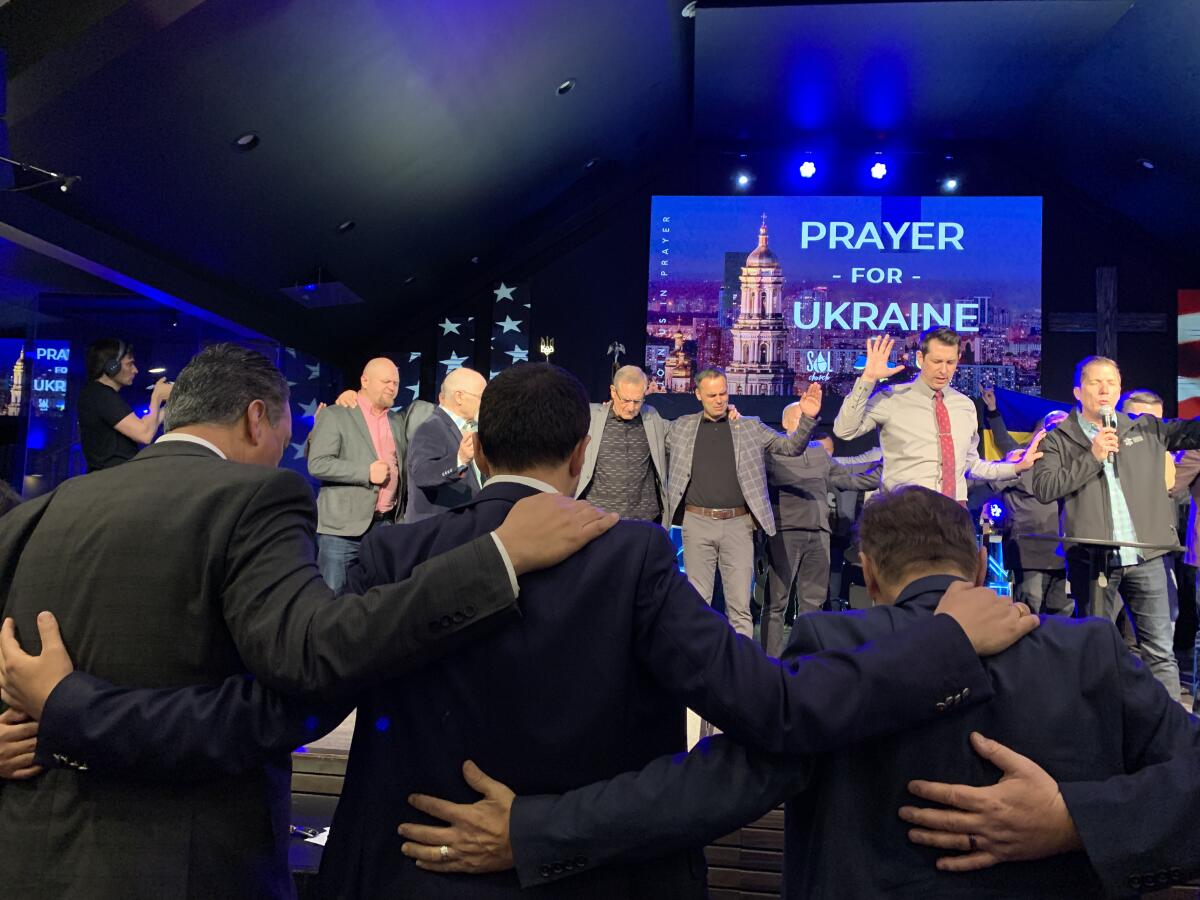
A giant Ukrainian flag had been erected in a courtyard, and beneath it, attendees drank coffee and ate sweets and pickles and samsas, meat dumplings from Ukraine. The church’s large parking lot was full long before the event began, and people parked blocks away and walked to the churchyard, greeting one another with subdued hugs and wide, worried eyes.
Inside the sanctuary, pastors from all over the region led prayers, politicians gave speeches and people sang.
“I stand with you,” Padilla told the standing-room-only crowd. He condemned the “brutal and unprovoked attacks” on the country, which he said were “an attack on democracy.”
He also pledged support for what termed “the largest humanitarian crisis in Europe since World War II.”
Indeed, many of the people praying with Padilla in the church said they had family members who planned to seek refuge in Poland or elsewhere, or had already begun to do so.
Paul Holovatyi, 41, who came to the U.S. from Ukraine four years ago and works fixing dental equipment, said his brother lives very close to the airport in the city of Lutsk, and the sound of fighting fills their apartment. “The kids are very scared,” he said.
The demonstrations, which followed other large protests and vigils around the state earlier this week, come while Ukrainian forces on Saturday struggled to hold on to Kyiv as Russian troops advanced into the outskirts of the capital city.
President Volodymyr Zelensky tried to rally his compatriots, appearing in a video shot on a Kyiv street to demonstrate that he had not abandoned the city and to urge Ukrainians to resist.
“We aren’t going to lay down weapons. We will protect the country,” Zelensky said. “It’s our land, our country, our children. And we will defend all of that.”
Three days since the Russians began their large-scale assault by air, land and sea, tens of thousands of Ukrainians have already fled west, some crossing into Poland and Romania. But thousands of Ukrainians have also responded to Zelensky’s call to take up arms to push back against the Russian blitz in what is Europe’s biggest ground war since World War II.
Times staff writers Dakota Smith and Ruben Vives reported from Los Angeles; staff writer Jessica Garrison reported from Sacramento.
More to Read
Sign up for Essential California
The most important California stories and recommendations in your inbox every morning.
You may occasionally receive promotional content from the Los Angeles Times.


